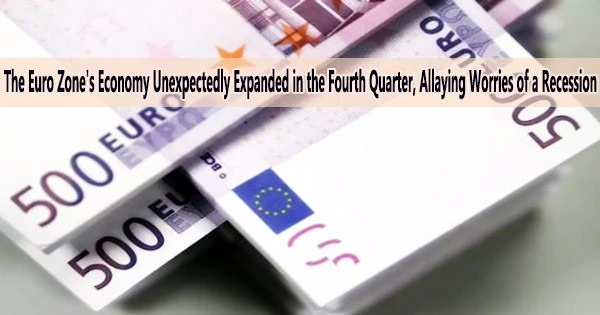By reporting positive growth in the fourth quarter of 2022, the euro zone exceeded forecasts on Tuesday (January 31, 2023) and allayed concerns about a probable regional recession.
According to preliminary Eurostat figures made public on Tuesday, the euro zone expanded by 0.1% in the fourth quarter. According to Reuters, economists had predicted a 0.1% contraction over that time.
The most recent numbers were released after the euro area’s GDP increased by 0.3% in the third quarter of last year.
After Russia invaded Ukraine, the region was put under a lot of stress as rising food and energy prices exacerbated already-existing supply chain bottlenecks. The 20-member area may be ready to experience an economic slump, analysts predicted last year.
In the later half of 2022, energy costs began to decline, which improved the overall economic performance of the euro zone.
The euro zone is expected to have grown by 1.9% in the fourth quarter, compared with the same period of 2021, according to the preliminary data.
Looking ahead, we think the euro-zone (excluding Ireland) will fall into recession in the first half of this year as the effects of the ECB’s policy tightening intensify, households struggle with the cost of living crisis and external demand remains sluggish.
Andrew Kenningham
“The advance euro zone GDP report shows that economic growth slowed again in the fourth quarter but didn’t fall outright, defying the message from the business surveys,” Melanie Debono, senior Europe economist at Pantheon Macroeconomics, said in an email to clients.
However, Germany surprised to the downside at a country breakdown level. In the final quarter of 2022, the largest European economy shrank by 0.2%, and economists now predict that Berlin will experience a recession.
“Germany has likely entered a shallow and short recession in the fourth quarter that will last through the first quarter before the economy stabilises in the second quarter (of this year),” Salomon Fiedler, economist at Berenberg, said in a note Monday.
Italy, the region’s third largest economy, also reported negative growth down by 0.1% in the fourth quarter. Rome and Berlin had some of the strongest links to Russian gas.
“Taking today’s data at face value means the euro zone likely avoided entering a technical recession this quarter, just. This will embolden the ECB to continue on its steep tightening path to fight inflation,” Debono from Pantheon Macroeconomics said.
The ECB is due to meet and determine its next monetary policy steps on Thursday. Economists polled by Reuters and Factset project that the bank will agree a 50 basis point increase in interest rates, taking its main rate to 2.5%.
Market players will be listening attentively to ECB President Christine Lagarde for clues on how many more rate hikes might occur over the coming months.
Some economists argue that the euro zone is still poised to enter a recession later this year.
“Looking ahead, we think the euro-zone (excluding Ireland) will fall into recession in the first half of this year as the effects of the ECB’s policy tightening intensify, households struggle with the cost of living crisis and external demand remains sluggish,” Andrew Kenningham, chief Europe economist at Capital Economics, said in an email Tuesday.
“But this will not put the ECB off its plans to hike rates further, including by 50 basis points on Thursday.” he added.
















